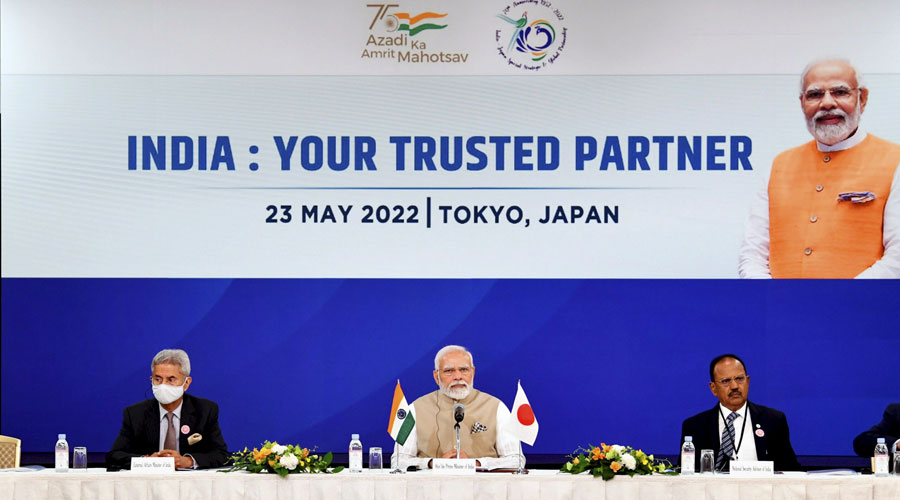India on Monday joined US President Joe Biden’s plank to counter the growing Chinese influence in the Indo-Pacific, becoming one of the “baker’s dozen” to sign up for the Indo-Pacific Economic Framework for Prosperity (IPEF) during Prime Minister Narendra Modi’s visit to Japan to attend a Quad summit.
In his remarks at the unveiling of the IPEF in Tokyo by Biden, Modi said: “The Indo-Pacific Economic Framework is a declaration of our collective will to make the region an engine of global economic growth. I thank President Biden very much for this important initiative.”
He added: “The Indo-Pacific region is the centre of manufacturing, economic activity, global trade and investment. History is witness to the fact that India has been a major centre in the trade flows of the Indo-Pacific region for centuries.”
Eleven other countries have decided to become initial partners in this venture, aimed at providing an alternative to the Chinese approach to the critical issues facing the region.
These countries are: Japan, Australia, Brunei, Korea, Malaysia, New Zealand, the Philippines, Singapore, Thailand, Indonesia and Vietnam.
In a pre-announcement briefing, US national security adviser Jake Sullivan described the 13 signatories as a “baker’s dozen”, adding that this was an open platform that other countries could join later.
The IPEF seeks to deepen trade ties between the US and the 12 other signatories. It represents an effort by Biden to boost US leadership in the region, five years after his predecessor Donald Trump pulled out of the Obama-era Trans-Pacific Partnership Agreement (TPP). Trump had withdrawn the US from the agreement before it had been ratified.
Unveiling the IPEF, Biden said: “We’re writing the new rules for the 21st century economy that are going to help all of our countries’ economies grow faster and fairer. We’ll do that by taking on some of the most acute challenges that drag down growth and by maximising the potential of our strongest growth engines.
“Let’s start with new rules governing trade in digital goods and services so companies don’t have to hand over the proprietary technology to do business in a country. Let’s create a first-of-its-kind supply chain commitment to eliminate bottlenecks in critical supply chains and develop early warning systems so we can identify problems before they occur. And let’s pursue other first-of-its-kind commitments to clean energy and decarbonisation.”
According to a fact sheet on the IPEF released by the White House, the initial signatories believe that success in the coming decades will depend on how well governments harness innovation — especially the transformations afoot in the clean energy, digital and technology sectors — while fortifying their economies against a range of threats, from fragile supply chains and corruption to tax havens.
Neither the fact sheet nor Biden mentioned China. But US secretary of commerce Gina Raimondo said: “As businesses are beginning to increasingly look for alternatives to China, the countries in the Indo-Pacific Framework will be more reliable partners for US businesses.”
She referred to reports about Apple looking to boost production outside China. “And many companies —many US companies — are looking to diversify away from China,” she said.
“Well, countries — Vietnam, Malaysia, Indonesia — that are actually signed up and in the Indo-Pacific Framework will obviously have an advantage to get that business from American companies, because they will have signed up to be (part of) the high-standard agreement that we plan to sign pursuant to the IPEF.”
Apart from participating in the IPEF event, Modi chaired a business roundtable in which CEOs and top executives of 34 Japanese companies participated. He also met several business leaders individually.
All of Modi’s bilateral meetings — with the US, Japan and Australia — are scheduled for Tuesday besides the Quad summit where all four heads of state or government will be present.












